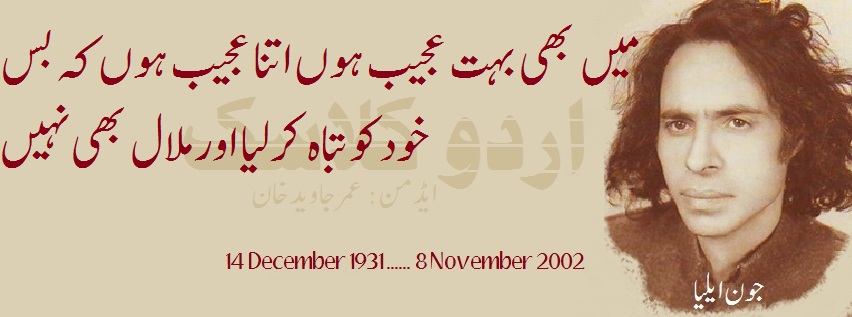Jaun Elia: A Concealed Philosopher Poet

Jaun Elia was such a Poet of Urdu language who influences and amuse the masses through his writing on various subjects.
Broadly, Jaun Elia falls in the first two categories of the poet whose poetry adoring beauty and love besides expressing the hardship of life in a philosophical manner. Perhaps he gains popularity because of his unconventional style of reciting poetry at Mushairas (poetry symposia) in which he glorifies his pain and portrays himself as an upset and struggling person. But in a real sense, Juan Elia was more than a poet. His writing talks about the life and its uncovered truth packed with the philosophical thoughts. He believes to himself as a nihilist, anarchist and a communist.
His knowledge about the western philosophy was not an ordinary one, he gave the references of the work and philosophy of Kant, Dante, Freud, David Hume, Imam Ghazali, Urfi, Voltaire, Plotinus Tolstoy and many others in his book titled ‘Shayad’.Jaun Elia was born on 14 th December 1931 at Amroha Uttar Pradesh and shifted to Karachi, Pakistan in 1957 with anguish in his heart. He was a Philosopher, Biographer, and Scholar. In his early life, he directed and acted too in drama. His poetry entails the particular attribute is due to the fact that he acquired knowledge of philosophy, logic, Islamic history, Muslim Sufi tradition, Muslim religious sciences, Western literature, and Kabbala the mystical aspect of Judaism.
Mayyat per ‘Sohraab’ ki ‘Firdosi’ ne naatak khela tha, us ke honton per they naale dil mein fan ka maila tha (On the funeral of Sohrab, Firdausi played the drama On his lips were lamentation but the heart was impure)
He was one of the most prominent modern Pakistani poets. Besides Urdu, he has fluency in Arabic, English, Persian, Sanskrit, and Hebrew due to this linguistic proficiency his poetry implicate the references of Sufism, Muslim spiritual, science, and Western literature. The reader of his poetry does not only know about the different perspectives of worldly affairs but also learns about the socio-religious segment that encourages them to think critically.
Poet Pirzada Qasim believes that Jaun’s poetry is rooted in the classical field. He introduces the new areas in poetry. His poetry is unique from all other poets of Urdu. Jaun Elia knew his merit and when he was unable to find his idealism became frustrated.
He wrote-
The life of Jaun Elia was full of pain and difficulty, he mentioned it in the preface of his book ‘Shayad’ that he did not write anything for the period of 10 years (1976- 1986) and lived in a single room. He wrote-
In metaphysical discourse, there are two parts to man’s existence- the spiritual and the temporal. Jaun’s understanding of the philosophy of life illustrates the deep understanding and recognition of the spiritual part of man in his poetry. He wrote-
Itna ḳhali tha andarun mera kuchh dino to ḳhuda raha mujh mai (How empty was my inner self Even God resides in me for a few days)
Jaun Elia believes that ‘when someone rises above temporal needs and rhymes his own silence then he is writing poetry’ this belief is similar to William Wordsworth for whom, ‘poetry is the instantaneous overflow of powerful feelings’. This spontaneity is exhibited in his poetry in all its shades. He wrote-
Apne andar hansta hun mein aur bohatt sharmata hoon Khoon bhi thooka sachmuch thooka aur ye sab chalaaki thi
Jaun says, ‘poetry is related to mind, and the purest condition of mind is manifested in logic’ and thus poetry is not beyond the logic. He wrote-
Jaun Elia left this world on 8th November 2002, he took his last breath in Karachi. He was optimistic about his readers and once he said,
Remembering Jaun Elia on his 87th birth anniversary.
